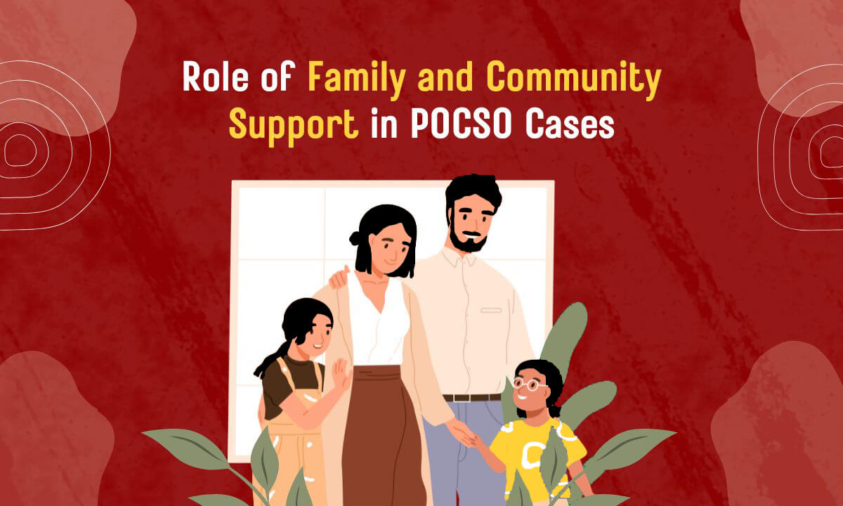Explore how family and community support shape recovery and justice in POCSO cases. Learn ways to provide trauma-informed, legal, and social care.
INTRODUCTION
The Protection of Children from Sexual Offences (POCSO) Act was created not just to punish offenders but to protect the child at every step—from disclosure to recovery. While the law outlines the legal path, the emotional and psychological scaffolding that a survivor needs often comes from closer to home: the family and community.
POCSO cases don’t exist in isolation. Children who survive sexual abuse face stigma, self-blame, fear, and legal confusion. In these moments, families and communities become the frontline defense—not just in supporting the child, but also in ensuring effective reporting, legal compliance, and emotional healing.
The Family as First Responders
In many POCSO cases, the abuser is someone known to the child, often within the family or close circle. This makes the family’s initial reaction crucial. Supportive families are more likely to:
- Believe the child’s account.
- Ensure timely medical and legal intervention.
- Shield the child from secondary trauma like victim-blaming.
A 2018 study by HAQ: Centre for Child Rights found that in nearly 60% of POCSO cases, children disclosed the abuse to a parent. However, outcomes varied significantly depending on the family’s response, ranging from compassionate support to outright disbelief or silencing.
Supporting Legal and Courtroom Processes
Under the POCSO Act, a child has the right to assistance throughout the legal process, including the presence of a “support person.” Often, this is a parent or guardian. Their role includes:
- Accompanying the child to court and police stations.
- Helping the child prepare emotionally for statements and cross-examination.
- Ensuring the child is not exposed to the accused.
However, many parents are unfamiliar with these rights and procedures. Several organisations have developed a helpful guide for caregivers to understand the steps involved in a POCSO case—from FIR to judgment.
Psychological First Aid at Home
Healing doesn’t start in the courtroom—it begins in the living room. Families that foster open communication, affirm the child’s innocence, and avoid shame-based language create an environment where children can begin to heal.
Trauma-informed parenting includes:
- Listening without judgment.
- Maintaining routines gives the child a sense of normalcy.
- Avoiding constant interrogation or dramatization of the incident.
Organizations like iProbono India offer training to caregivers on how to emotionally support children through trauma and legal proceedings.
Breaking the Silence in Communities
In many Indian communities, sexual abuse is still a taboo topic. Survivors face ostracism, while families are discouraged from reporting due to social shame or threats. Community support, or the lack thereof, can determine whether a case is reported or buried.
Here’s how communities can act as enablers rather than barriers:
- Schools and Panchayats can act as reporting channels and education hubs.
- Faith leaders and local influencers can help reduce stigma.
- Resident Welfare Associations (RWAs) can conduct awareness drives about Childline 1098 and POCSO protections.
Community Watch: A Preventive Role
Community networks—when trained—can serve as eyes and ears on the ground, especially in rural or high-risk urban areas. Community members can:
- Spot early signs of grooming or abuse.
- Monitor unsafe areas like public toilets, alleyways, or overcrowded households.
- Report suspicious behavior anonymously via POCSO e-Box.
Programs like the Village Child Protection Committees (VCPCs) under Integrated Child Protection Scheme (ICPS) are already active in several districts and can be strengthened through local involvement.
Helping Survivors Reintegrate
The road to healing extends beyond the verdict. Reintegration into school, friendships, and social life is vital for the child’s long-term mental health. Families and communities must:
- Avoid labeling or discussing the abuse in public.
- Ensure children aren’t excluded from activities due to their past.
- Encourage schools to practice inclusion and sensitivity.
Programs like Make Love Not Scars, although focused on acid attack survivors, offer a great model for how community-backed reintegration can transform lives.
Capacity Building Through NGO Partnerships
Families and communities don’t need to act alone. Collaborating with NGOs can provide:
- Access to trauma counseling.
- Training workshops for parents and teachers.
- Legal aid services and referrals.
If you’re unsure where to start, consult local chapters of NGOs like Save the Children India, Child Rights and You (CRY), or Shakti Shalini, all of whom offer child protection resources for community leaders and guardians.
Final Thoughts
In POCSO cases, justice is not just what happens inside a courtroom, it’s what happens after the door closes at home, and in whispers at the local market, and in how schools treat a returning survivor. Laws can set the framework. But it’s families and communities that give those laws their power—by choosing to believe, to act, and to heal.
In case you are looking for customized child safety training, POCSO-related training, or POCSO advisory services, please feel free to reach out to us at +919004521614 or [email protected].
Authored by Tanvi Ojha, Content Writer Intern


 Cart is empty
Cart is empty 
